
We kindly inform you that, as long as the subject affiliation of our 300.000+ articles is in progress, you might get unsufficient or no results on your third level or second level search. In this case, please broaden your search criteria.

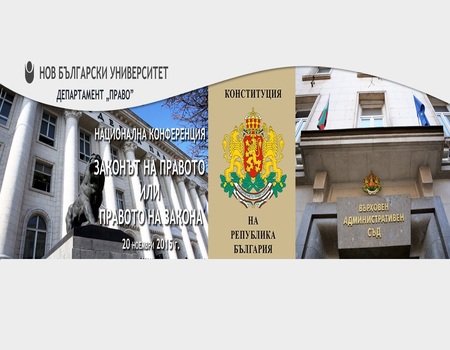
Some of the elements of a sustainable restorative justice politics will be presented – at the intersection of jurisdiction, law, education, social work, local governance, etc. An analysis of these will be suggested with the aim of a realistic planning of the change and of preserving its core values.
More...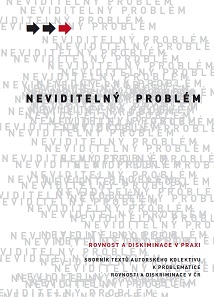






This article provides a comparative analysis of the changes brought forward by the Retail Investment Strategy (RIS) proposal within the European Union and a critical discussion of its potential impacts. Given the limited scope of this article, the authors intend to deal mostly with cross-border business relations. The purpose of our research was to assess the impact of the current wording of the RIS proposal on existing legislative framework (MiFID, IDD, PRIIPs, and others) and to highlight potentially problematic or even counterproductive provisions. The RIS proposal impacts a wide spectrum of financial products and represents a further stage of so-called "Mifidization process". Talking about a strategy that will result in a framework amending several areas of financial services, one would reasonably expect to see unification and simplification tendencies, e.g. in information disclosure requirements. Last but not least it is rational to assume compatibility with existing legal framework, e.g. Rome I Regulation. But is this really the case? And will it lead to higher consumer protection and financial literacy standards? As we see it, the European Commission's proposal raises many hidden challenges that may prove problematic in practice and should therefore be further considered by the European Parliament and Council as a part of the upcoming European legislative process.
More...
Supplementary pension savings represent one of the results of the diversification of the pension system in the Slovak Republic. For the majority of the population, with the exception of selected types of professions, participation in supplementary pension savings is voluntary. In order to ensure and improve the standard of living of individuals in the post-productive age, the legislator has introduced in the legal order regulations that should motivate to participation in supplementary pension savings, such as the possibility to inherit the value of a personal account, tax benefits or employer contributions. The paper contains a set of proposals and reflections of the authors on what other possible mechanisms should be introduced in order to increase interest in saving the so-caller third pillar both on the part of the participant and on the part of their employer.
More...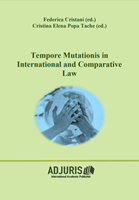
Generative artificial intelligence (GenAI) represents artificial intelligence (AI) capable of creating new content, in different formats (text, images, audio, video, etc.), by applying large-scale machine learning models. The application of GenAI tools in different fields have led to intense debates within the professional communities, but also in the public space, regarding the performance ensured by the use of GenAI tools (ChatGPT, Gan.ai, CodeWP, DecorAI, SchoolAI, etc.), but also the aspects of the ethical and legal nature associated with the use of these tools. Education and scientific research represent two of the fields in which GenAI tools have been and are increasingly used today, causing real concerns, mainly in terms of ensuring the development of students' skills, on the one hand and respecting copyright and intellectual property rights, on the other hand. The European Parliament discussed a series of documents related to AI, documents that define a European approach to the use of AI systems. The paper aims to present the results of a study carried out by the authors about the ethical and legal implications of using GenAI in education and research. Also, the authors analyzed the European approach in AI systems, to establish to what extent it satisfies the regulatory requirements for the use of GenAI in the fields of education and scientific research and represents an appropriate starting point in defining the future European legislation in the field of AI.
More...
One of the important questions of European integration and the history of the EU's development is whether the European community can move from an Europe of nations to the concept of a United States of Europe, and whether this is even a good goal for European integration. In a Europe unifying towards statehood, elections (and voting rights) must necessarily unify. This study examines the relationship between EU citizenship and the concept of electoral law (i.e. the definition of active and passive eligibility) – based on the analysis of the primary legal sources and the literature. In my opinion (based on my research), at the current stage of integration, it is not realistic to consider an alternative that would place EU citizenship (at least in terms of voting rights) alongside or even above national citizenship, either for European Parliament elections or for national parliamentary elections. However, while in the case of elections to the European Parliament there is a regulatory principle (namely nationality) which could at least be added to national citizenship as a kind of subsidiary rule, in the case of elections to national parliaments a change of the rules to an EU citizenship-based approach seems unthinkable.
More...
Because judicial activity involves a certain amount of risk, being carried out by people, the possibility of miscarriages of justice subsists in any legal system. However, hypotheses of judicial error, which essentially involve non-compliance with procedural or substantive law rules with serious consequences for citizens' rights and freedoms, impose a positive obligation on the State to repair the damage thus caused, since the State is the guarantor of an act of justice governed by the principle of fair trial. Since the activity of judges must enjoy the guarantees deriving from the principle of judicial independence, a direct action against the magistrate responsible for exercising his office with gross negligence or bad faith is not admissible. However, a subsidiary action is regulated in many European legal systems, and the possibility of triggering disciplinary liability mechanisms against the guilty magistrate can be found in any legal system. The research methods used in order to achieve this aim are the comparative method, the analytic and historical methods.
More...
Nowadays, with the development of technology and globalization, implementing the law and regulations on data protection is particularly important. Implementing the Law on Data Protection in Albania has faced several obstacles and challenges because of how the information is distributed daily in social media. Although there are some regulations, bylaws, and obligations for data processing and an independent institution specialized in this field, there are concerns about the administration and illegal dissemination of personal data. The issue of data protection during investigation, prosecution, and judgment is directly linked with the presumption of innocence and the due process of law. The way the media covers an article on a criminal case can sometimes influence the court's decision. Sometimes, the journalist, during the processing of the personal data of persons under investigation, may violate even the secrecy of the investigation. This article aims to analyze the legal framework on data protection in criminal proceedings in Albania and how implementing the Law on data protection can affect the administration of justice.
More...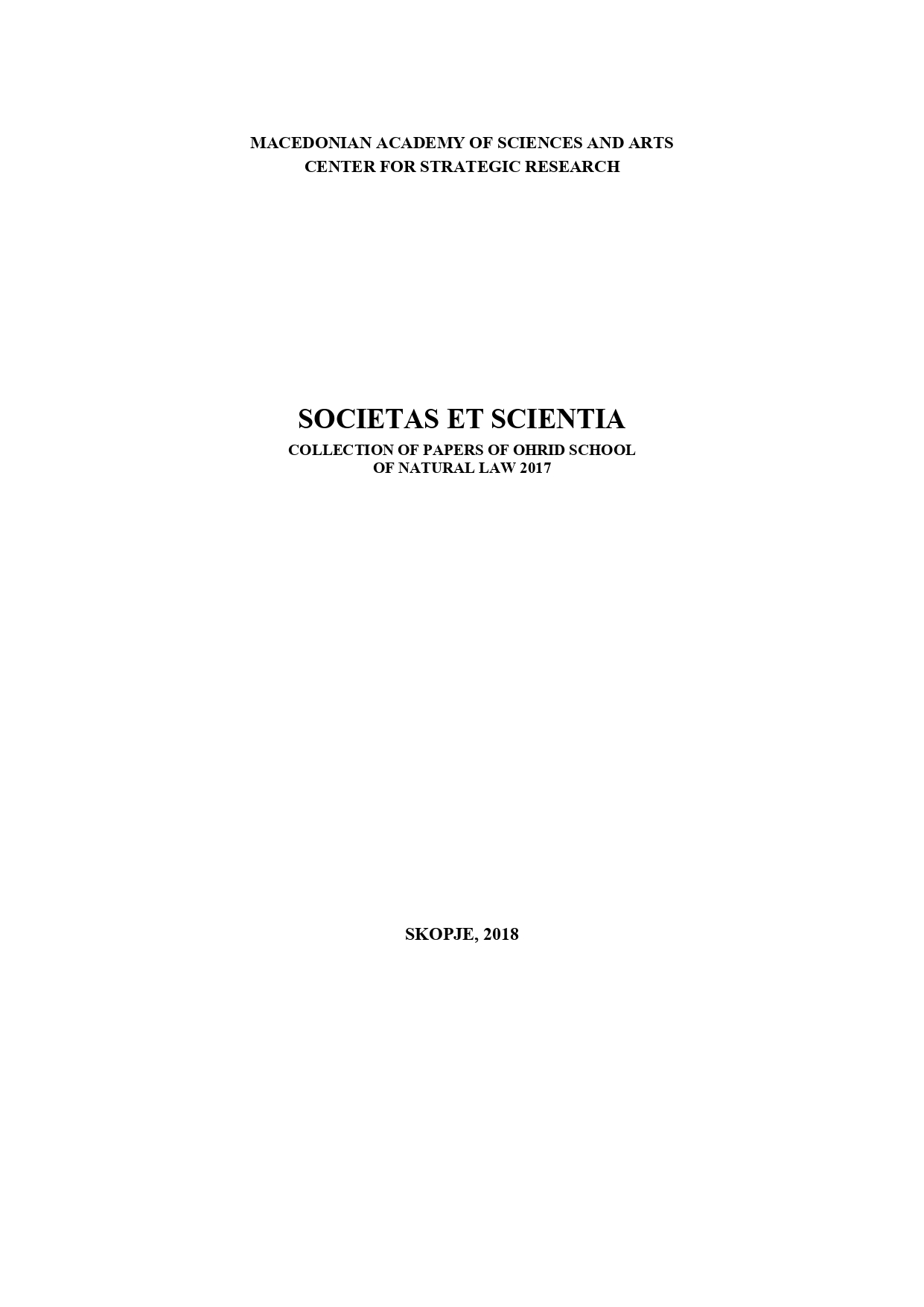
Зависноста од дроги како општествен феномен постои уште многу одамна и е неодминлив процес од развојот на секое општество. Со оглед на штетните последици кои се јавуваат како резултат на користењето на дроги, зависноста од дроги речиси секогаш претставува негативна појава која го разорува не само поединецот туку и целокупното општество. Давајќи ѝ негативен предзнак на оваа општествена појава, на лицата кои користат дроги или на лицата кај кои е веќе развиена зависноста од дроги исто така се гледа како на непосакувани лица, отфрлени од општеството. Според тоа, иако гарантирањето и почитувањето на човековите слободи и права претставува темелна вредност на секое демократско општество и воопшто на градењето и функционирањето на демократските држави, лицата зависни од дроги најчесто се ограничени во остварувањето на своите права токму поради негативниот став на општеството кон нив. Со други зборови овие лица влегуваат во една од најмаргинализираните категории на лица, кои се соочуваат со социјална исклученост предизвикана од постоењето на предрасудите, стереотипите и високиот степен на дискриминација и стигматизација од страна на општеството. Иако голем дел од државите преземаат разновидни институционални мерки и активности за надминување на овој проблем, водејќи полиберални политики за дроги со цел да се подигне свеста на населението за овој секојдневен феномен, сепак фактот дека лицата зависни од дроги се ограничени во остварувањето на своите права, останува карактеристика на демократското општество. Не земајќи го предвид нарушувањето на личниот интегритет и достоинство на лицата зависни од дроги поради дискриминирачкиот однос од севкупното население, а во голем дел и од државниот апарат, овие лица првенствено имаат потреба од остварување на правото на здравствена заштита токму поради последиците кои користењето на дроги ги предиз- викува по здравјето на поединците од една страна и потребата од третман и лекување на зависноста од дроги од друга страна. Според тоа, остварувањето на правото на здравствена заштита од страна на државата, на -- лицата зависни од дроги не само што ќе им овозможи достоинствен и квалитетен живот, туку ќе придонесе и кон намалувањето на зависноста од дроги како масовна општествена појава.
More...
Traditionally, the basic criminal sanction is imprisonment, which is why in many legal systems the branch of law that is traditionally designated as criminal law in our country is called criminal law. If they would consider the prison sentence as the basic or dominant criminal sanction, then they could relatively easily label all other criminal sanctions as alternative. One of the more current issues of criminal law is the issue of alternative criminal sanctions. Alternative criminal sanctions mean all those sanctions that are an alternative to the penalty of deprivation of liberty and which are also followed by the penalty of deprivation of liberty as an instrument to ensure compliance with the imposed alternative criminal sanction. When it comes to criminal sanctions, in order for a certain criminal sanction to be considered an alternative, the existence of a primary criminal sanction is necessary. In the paper, we talk about the advantages and characteristics of alternative criminal sanctions, as well as divisions based on various criteria and their role in criminal legislation.
More...
Conditional release is a measure that aims to "bring to an end" the process of resocialization of the offender at liberty. According to the opinion of the majority of lawyers and penologists, this process starts from the moment of initiation of criminal proceedings against that person until the last measures taken by the state in order to resocialize him. These last measures can also be final treatments in penal institutions, in other institutions if it is a question of security measures, that is, in the case of the application of some of the alternative sanctions or measures. The decision to release a person on parole is made by the Parole Commission, which functions within the Ministry of Justice. In this paper, we will point out the characteristics of parole and its significance as a legal instrument in the process of resocialization of convicted persons.
More...
Probation refers to the implementation of sanctions and measures in the community that are defined by the Law and that are applied to offenders. Also, probation implies a system of activities and interventions that include supervision, guidance and assistance, all with the aim of social integration of convicted persons as well as contributing to public safety. The institute of probation has been known and applied by numerous developed democratic societies for more than 170 years. Probation, in the most general terms, is treatment at liberty, as a rule conditional. The probation system has taken root in the countries of the region in the last thirty years. In Bosnia and Herzegovina, work is being done rapidly on the education of penological staff and on changing and adapting the laws related to this area. The goal of this work is to highlight the role and significance of the probation system and alternative criminal sanctions in the non-institutional treatment of perpetrators of criminal acts and their resocialization within the community.
More...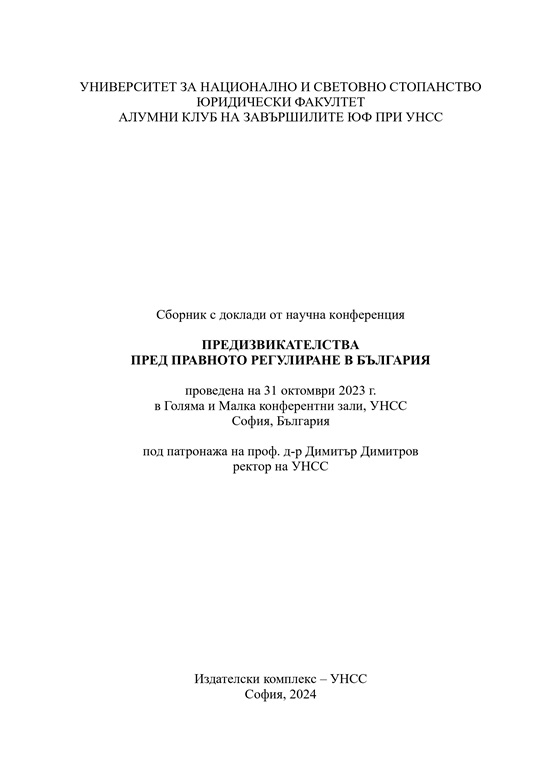
Bulgarian common lawis an integral part of the history of the Bulgarian state and law. In the Middle Ages, a number of researchers of the problem assumed that inheritance in our country took place in a way that was regulated by the Croatian and Russian sources, namely, by custom, only the sons, not the daughters, of the testator inherited. This was also preserved in the years of Ottoman rule, when only sons and male descendants inherited. In most Bulgarian lands, daughters and female descendants did not inherit. They were entitled to receive clothing and a dowry. After the Inheritance Law of 1890 came into force in Bulgaria, daughters were given the right to inherit the property of their deceased father. Despite the right recognized by law, the people did not approve of this. The usual provisions governing the division of the father's property are also diverse.
More...
The Act on treatment of minors in criminal proceedings, which is a specialized legal act in the legal system of Montenegro, provides for special protection measures for children as participants in criminal proceedings, including children who are victims of a criminal act, as well as child witnesses. The judicial system of Montenegro respects all international conventions related to the rights of children and their protection, which also indicates the dedication of society itself to this increasingly challenging problem in the 21st century. In the paper, we will point out the specifics of the Law on Treatment of Minors in Criminal Proceedings of Montenegro, as well as the difficulties and challenges that the justice system faces in working with juvenile offenders, as well as their resocialization in educational institutions
More...